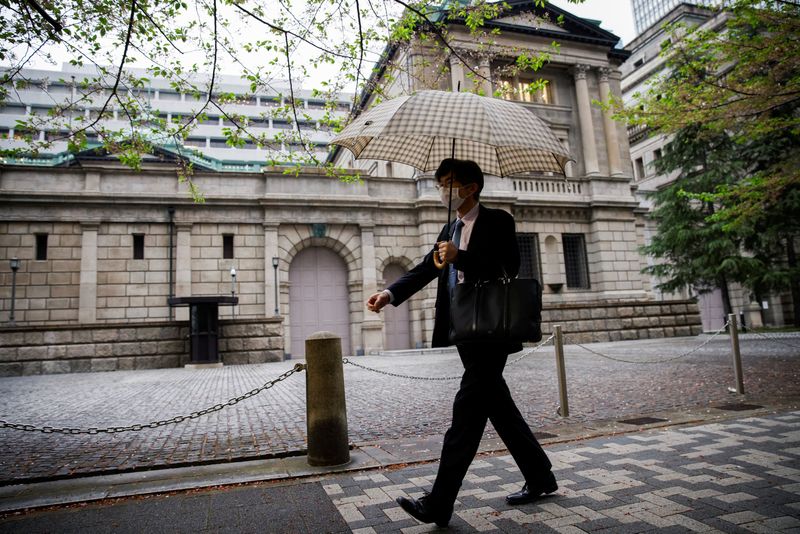[the_ad id="21475"]
[ad_1]
© Reuters. FILE PHOTO: An office employee walks in front of the bank of Japan building in Tokyo, Japan, April 7, 2023. REUTERS/Androniki Christodoulou
2/2
By Leika Kihara
TOKYO (Reuters) – Japan’s bitter memories of its decades-long battle with deflation hang heavily over the central bank’s deliberations to take its first modest step away from ultra-loose monetary policy, even as inflation and wages creep up.
The appointment of Kazuo Ueda as Bank of Japan (BOJ) governor this year and mounting price pressures have fired up market chatter that the new chief might hasten an exit from the bold stimulus of his predecessor Haruhiko Kuroda.
But uncertainty over the wage outlook and emerging global economic weakness heighten the chance the BOJ will hold off tweaking its controversial yield curve control (YCC) policy at least until autumn, say three sources familiar with its thinking.
“In a country that has seen interest rates stay ultra-low for two decades, the shock of the BOJ’s first move could be enormous,” said one of the sources. “That’s enough to make the BOJ cautious.”
Japan has not seen interest rates rise since 2007, when the BOJ hiked short-term rates to 0.5% from 0.25% in a move later criticised for delaying an end to price stagnation.
Having taken part in Japan’s battle with deflation as BOJ board member from 1998 to 2005, Ueda knows all too well the danger of a premature exit from ultra-loose policy.
Wary of a wobbly recovery, he opposed the BOJ’s decision in 2000 to raise short-term rates to 0.25% from zero.
The bank drew significant political heat for that tightening and was forced to reverse course just eight months later and adopt quantitative easing.
Given the trauma of such ill-timed policy shifts, caution will be Ueda’s priority, the sources say, suggesting an end to YCC, which caps the 10-year bond yield around zero, could be some time away. That would mean more significant policy changes are even further down the track.
“Tweaking the yield cap alone may not do much harm to the economy, as long as short-term rates are kept low,” one of the sources said. “But the BOJ’s long, historical struggle with deflation can’t be taken lightly.”
SHIFTING PRIORITIES
One key difference between the BOJ’s and the market’s thinking lies in Japan’s inflation outlook.
On the surface, conditions for phasing out a portion of the BOJ’s massive stimulus appear to be falling in shape.
Core consumer inflation hit 3.4% in April, holding above the BOJ’s 2%…
Click Here to Read the Full Original Article at All News…
[ad_2]
[the_ad id="21476"]
